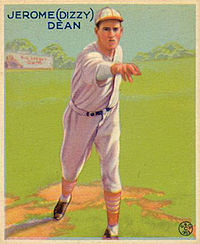Dizzy Dean
As Dean worked his way through the Sox lineup, an exasperated Chicago manager reportedly yelled "Knock that dizzy kid out the box!"
[8] Dean made his professional debut in 1930 and worked his way up to the major leagues that same year, throwing a complete game three-hitter for the Cardinals.
Dean pitched his first full season in 1932 and turned in a stellar rookie campaign, leading the major leagues with 191 strikeouts and four shutouts.
St. Louis was the southernmost and westernmost city in the major leagues at the time, and the Gashouse Gang became a de facto "America's Team."
Americans saw in these players a spirit of hard work and perseverance, as opposed to the haughty, highly paid New York Giants, whom the Cardinals chased for the National League pennant.
"[6] On September 21, Dean pitched no-hit ball for eight innings against the Brooklyn Dodgers, finishing with a three-hit shutout in the first game of a doubleheader, his 27th win of the season.
"Gee, Paul," Dean was heard to say in the locker room afterward, "if I'd a-known you was gonna throw a no-hitter, I'd a-throw'ed one too!"
Coming back too soon from the injury, Dean changed his pitching motion to avoid landing as hard on his sore toe enough to affect his mechanics.
Hopeful it would, Chicago Cubs owner Philip K. Wrigley ordered scout Clarence "Pants" Rowland to buy Dean's contract at any cost.
On April 16, Rowland obtained Dean in a trade for three players (pitchers Clyde Shoun and Curt Davis and outfielder Tuck Stainback) plus $185,000 in cash - an enormous sum then.
[14] In limited use Dean proved exceptional - going 7-1 and posting a 1.81 ERA, by far the best of his career - helping the Cubs win the 1938 National League pennant.
[15] By September 27, with one week left in the season, the Cubs had battled back to within a game and a half of the Pirates in the National League standings as the two teams met for a crucial three-game series.
[15] Dean pitched the opening game of the series and with an ailing arm, relied more on his experience and grit to defeat the Pirates by a score of 2–1.
[17] Returning to the Cubs in 1939, Dean made 19 appearances (13 starts) resulting in a 6–4 record with 7 complete games, 2 shutouts, and a still well above league average 3.36 ERA.
[20] In 1942, Dean appeared in one game for the Superior Blues, a Class C team in the Northern League; as the starting pitcher, he allowed three runs in two innings,[21] and then played in the outfield.
Dean pitched the first four innings, giving up four hits and one run, and then played in right field for the remainder of the game, which the Green Sox won, 14–5.
[25] After retiring as a player, the still-popular Dean was hired as a broadcaster by the perennially cash-poor St. Louis Browns to drum up some badly needed publicity.
The wives of the Browns pitchers complained, and management, needing to sell tickets somehow, took him up on his offer and had him pitch the last game of the season versus the Chicago White Sox.
Following his playing career, Dean became a well-known radio and television sportscaster, calling baseball for the Cardinals (1941–1946), Browns (1941–1948), Yankees (1950–1951), and Atlanta Braves (1966–1968) and nationally with Mutual (1952), ABC (1953–1954), and CBS (1955–1965), where he teamed first with Buddy Blattner then with Pee Wee Reese.
These manglings of the language only endeared Dean to fans, being a precursor of such beloved tongue-tangled ballplayers-turned-broadcasters as Ralph Kiner, Herb Score, and Jerry Coleman.
In the 1950s, Dean appeared in guest roles on Faye Emerson's Wonderful Town on CBS and on The Guy Mitchell Show on ABC.
[30] The plant was anticipated to use $200,000 worth of low-quality hardwood scraps each year in the production of 10,000 tons of briquets annually when fully on line.
Chet Huntley, who would later gain fame as an NBC News anchorman, played an uncredited role in the movie as Dean's radio announcing sidekick.
The Dean exhibit is now part of the Mississippi Sports Hall of Fame & Museum, located adjacent to Smith-Wills Stadium, a former minor-league baseball park.
[35] In the 1971 sci-fi movie The Resurrection of Zachary Wheeler, Leslie Nielsen answers incorrectly "Dizzy Dean, 1935" when asked in which season did a pitcher win 30 games before Denny McLain.
"[citation needed] Dean was parodied in the 1936 Merrie Melodies cartoon Boulevardier from the Bronx with a character named Dizzy Dan.
[citation needed] In 2015, author Carolyn E. Mueller and illustrator Ed Koehler published an animated book titled Dizzy Dean and the Gashouse Gang (ISBN 978-1-68106-002-6).
The book showcases the antics of Dizzy and his brother Paul Dean, Joe Medwick, Pepper Martin, player/manager Frankie Frisch, and the 1934 St. Louis Cardinals season in their quest to win their third World Series.



